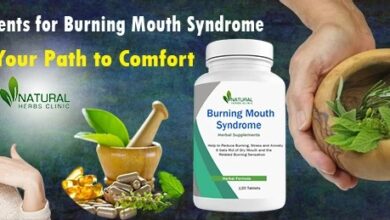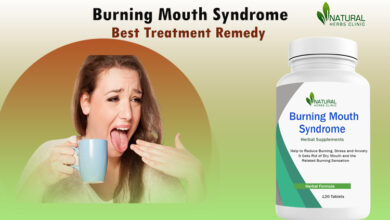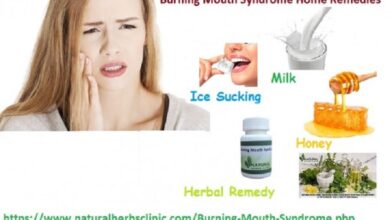Burning Mouth Syndrome Sufferers Swear By These 7 Supplements
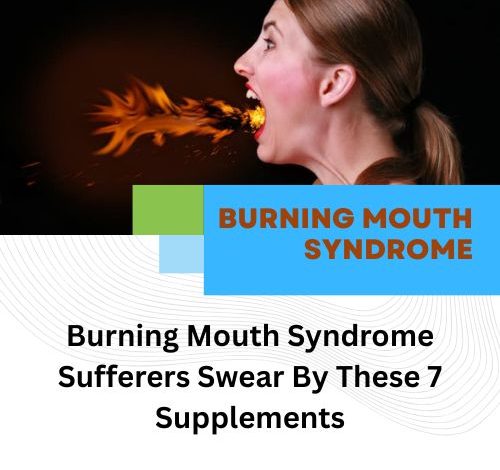
Burning Mouth Syndrome (BMS) is a painful, often frustrating condition that causes a burning sensation in the tongue, lips, gums, or the entire mouth without an apparent cause. While there is no universal cure, many Burning Mouth Syndrome sufferers have found relief through targeted dietary strategies. One increasingly popular approach involves the use of specific Herbal Treatment for Burning Mouth Syndrome dietary supplements. These supplements may help address potential nutritional deficiencies, reduce inflammation, and support overall oral health. For those seeking relief, exploring high-quality supplements for Burning Mouth Syndrome could be a beneficial step in managing symptoms.
What is Burning Mouth?
Burning Mouth is a condition characterized by a persistent burning, scalding, or tingling sensation in the mouth, often without any visible signs or identifiable cause. This discomfort can affect the tongue, lips, gums, inner cheeks, roof of the mouth, or the entire oral cavity. The pain may start suddenly or develop gradually over time. In some cases, nutritional deficiencies, particularly vitamin B12, iron, or folate, may contribute to the symptoms. If you’re wondering ‘what vitamin deficiency causes burning mouth syndrome?’, addressing these deficiencies could help alleviate the discomfort.
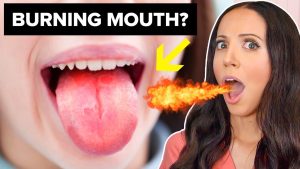
Common Symptoms of Burning Mouth:
- A burning or hot feeling in the mouth (especially the tongue)
- Dry mouth or increased thirst
- Altered taste (metallic or bitter)
- Loss of taste
- Tingling, numbness, or soreness in the mouth or tongue
What Is Burning Mouth Syndrome (BMS)?
When the burning sensation occurs without any apparent dental or medical reason, it is referred to as Treat Dry mouth and Sore Throat. BMS is considered a chronic pain condition and can significantly impact quality of life, including eating, speaking, and emotional well-being.
Who Is Affected?
Burning Mouth is more common in:
- Women, especially postmenopausal
- Adults over the age of 50
- Individuals experiencing high stress or anxiety
- People with certain nutritional deficiencies (e.g., B12, iron, zinc)
Possible Causes:
- Nutritional deficiencies
- Hormonal changes
- Nerve damage
- Dry mouth (xerostomia)
- Allergies or reactions to dental products
- Underlying medical conditions (e.g., diabetes, thyroid issues)
- Psychological factors such as stress, anxiety, or depression
Here are 7 supplements that Burning Mouth Syndrome sufferers consistently swear by:
Related Articles: Over the counter Treatment for Burning Mouth Syndrome
1. Alpha-Lipoic Acid (ALA)
Alpha-Lipoic Acid is a powerful antioxidant that helps protect nerves from damage and supports nerve regeneration. Many Burning Mouth Syndrome sufferers use ALA because it may reduce the burning sensation by improving nerve function and decreasing inflammation in the mouth. Studies suggest that regular supplementation with ALA can lead to noticeable relief from pain and discomfort associated with BMS.
2. Vitamin B12
Vitamin B12 is crucial for healthy nerve function and blood cell production. A deficiency in this vitamin can cause nerve damage and lead to symptoms like burning sensations in the mouth. Many Herbal Supplement for Burning In the Mouth Syndrome sufferers benefit from taking vitamin B12 supplements, which help restore nerve health, reduce pain, and improve overall oral comfort. Sublingual forms of B12 are often preferred for better absorption. For those struggling with burning mouth syndrome B12 supplementation can be a key part of relieving discomfort and supporting long-term oral health.
3. Zinc
Zinc is an essential mineral that plays a vital role in many biological functions. It is required for the activity of over 300 enzymes and is involved in immune function, protein synthesis, wound healing, DNA synthesis, and cell division.
Functions of Zinc:
- Supports a healthy immune system
- Aids in wound healing
- Helps maintain skin integrity
- Supports normal growth and development during pregnancy, childhood, and adolescence
- Contributes to taste perception and appetite regulation
Sources of Zinc:
- Meat (beef, pork, lamb)
- Shellfish (especially oysters)
- Legumes (chickpeas, lentils, beans)
- Seeds and nuts (pumpkin seeds, cashews)
- Dairy products
- Whole grains
Zinc Deficiency:
Symptoms of deficiency can include:
- Weakened immune function
- Hair loss
- Delayed wound healing
- Loss of appetite
- Impaired growth in children
Recommended Intake:
- Men (adults): ~11 mg/day
- Women (adults): ~8 mg/day
- Higher amounts may be needed during pregnancy and breastfeeding.
4. Iron
Iron is a crucial mineral that the body needs to produce hemoglobin, a protein in red blood cells that carries oxygen from the lungs to the rest of the body. It’s also essential for growth, development, normal cellular function, and the Best Herbal Supplements Products and Natural Remedies production of some hormones. Maintaining adequate iron levels can also help alleviate certain menopausal symptoms, such as fatigue. For those seeking relief from discomfort like a burning tongue during menopause, exploring natural remedies for burning tongue menopause, such as iron-rich herbs or supplements, may offer additional support.
Related Articles: Home Treatments for Burning Mouth Syndrome Alleviate the Discomfort
Functions of Iron:
- Helps form hemoglobin and myoglobin (oxygen-carrying proteins)
- Supports energy metabolism
- Essential for proper immune function
- Plays a role in cognitive development and body temperature regulation
Sources of Iron:
There are two types of dietary iron:
- Heme iron (easily absorbed): Found in animal products like red meat, poultry, and fish
- Non-heme iron (less easily absorbed): Found in plant-based foods like lentils, beans, tofu, spinach, fortified cereals, and nuts
Vitamin C can help enhance the absorption of non-heme iron when eaten together.
Iron Deficiency:
Iron deficiency is one of the most common nutritional deficiencies and can lead to:
- Anemia (low red blood cell count)
- Fatigue and weakness
- Pale skin
- Shortness of breath
- Dizziness
- Poor concentration and cold hands and feet
Recommended Intake:
- Men (adults): ~8 mg/day
- Women (ages 19–50): ~18 mg/day (due to menstruation)
- Pregnant women: ~27 mg/day
- Postmenopausal women: ~8 mg/day
5. Vitamin D
Vitamin D is a fat-soluble vitamin that plays a key role in maintaining healthy bones and teeth. It also supports the immune system, brain, and nervous system, and helps the body absorb calcium and phosphorus.
Related Articles: Fungal Mouth Infection: Extensive Guide to Exposing and Treating
Functions of Vitamin D:
- Promotes calcium absorption in the gut
- Maintains bone and tooth health
- Supports immune system function
- Contributes to muscle strength
- Plays a role in reducing inflammation
Sources of Vitamin D:
- Sunlight – The body can produce vitamin D when the skin is exposed to sunlight (UVB rays).
- Foods – Few foods naturally contain vitamin D, but some good sources include:
- Fatty fish (salmon, mackerel, sardines)
- Fish liver oils
- Egg yolks
- Fortified foods (milk, cereal, orange juice)
- Supplements – Often recommended for those who have limited sun exposure or dietary intake.
Vitamin D Deficiency:
Lack of vitamin D can lead to:
- Rickets in children (soft, weak bones)
- Osteomalacia in adults (bone pain and muscle weakness)
- Increased risk of osteoporosis and fractures
- Weakened immune function
- Mood issues such as depression
Recommended Intake:
- Adults (19–70 years): 600 IU/day (15 mcg)
- Adults over 70 years: 800 IU/day (20 mcg)
- Infants (0–12 months): 400 IU/day (10 mcg)
6. Magnesium
Magnesium is an essential mineral involved in hundreds of biochemical reactions in the body. It supports muscle and nerve function, regulates blood pressure, and helps build strong bones and teeth.
Functions of Magnesium:
- Supports muscle and nerve function
- Regulates blood sugar and blood pressure
- Aids in the production of energy
- Helps in protein synthesis and DNA repair
- Contributes to bone health
- Plays a role in maintaining a steady heart rhythm
Sources of Magnesium:
Magnesium is found in a wide variety of foods, including:
- Leafy green vegetables (spinach, kale)
- Nuts and seeds (almonds, pumpkin seeds)
- Whole grains (brown rice, oats)
- Legumes (black beans, lentils)
- Bananas and avocados
- Dark chocolate
- Magnesium-fortified foods and supplements
Magnesium Deficiency:
Signs of deficiency can include:
- Muscle cramps or spasms
- Fatigue or weakness
- Nausea or loss of appetite
- Abnormal heart rhythms
- Numbness or tingling
- Increased risk of osteoporosis, migraines, and mental health issues
Recommended Intake:
- Men (ages 19–30): ~400 mg/day
- Men (31+): ~420 mg/day
- Women (ages 19–30): ~310 mg/day
- Women (31+): ~320 mg/day
- Higher needs during pregnancy and breastfeeding
7. Omega-3 Fatty Acids
Omega-3 fatty acids are essential healthy fats that the body cannot produce on its own. They play a key role in brain function, heart health, and reducing inflammation throughout the body.
Types of Omega-3s:
- ALA (Alpha-linolenic acid) – Found in plant sources like flaxseeds, chia seeds, and walnuts
- EPA (Eicosapentaenoic acid) – Found in fatty fish and fish oil
- DHA (Docosahexaenoic acid) – Also found in fatty fish and is crucial for brain and eye health
Functions of Omega-3s:
- Support heart health by reducing triglycerides and lowering blood pressure
- Help reduce inflammation in the body
- Promote brain health and may help with mood and mental function
- Support eye health and normal vision
- Important for fetal development during pregnancy
Sources of Omega-3s:
- Fatty fish (salmon, mackerel, sardines, tuna)
- Fish oil supplements
- Flaxseeds, chia seeds, and hemp seeds
- Walnuts
- Algae-based supplements (a plant-based source of DHA)
Omega-3 Deficiency:
Possible signs include:
- Dry skin and eyes
- Fatigue
- Poor memory
- Mood swings or depression
- Heart problems in the long term
Recommended Intake:
There is no official RDA (Recommended Dietary Allowance), but health organizations suggest:
- 250–500 mg of combined EPA and DHA per day for general health
- Higher doses may be recommended for heart health or under medical supervision
For specific conditions like burning mouth syndrome vitamin deficiency (such as B12, iron, or omega-3s) may play a role consult a healthcare provider for personalized advice.
Final Thoughts
While BMS can be challenging to treat, many Burning Mouth Syndrome sufferers have found relief through consistent use of targeted supplements as an over the counter treatment for burning mouth syndrome. Options like vitamin B12, alpha-lipoic acid, and zinc lozenges may help manage symptoms. However, it’s important to consult with a healthcare provider before starting any new supplement, especially to identify underlying deficiencies or conditions that may be contributing to symptoms. For those exploring burning mouth syndrome natural remedies, lifestyle adjustments such as stress management, avoiding acidic foods, and staying hydrated can also play a supportive role in symptom relief.
By incorporating the right Burning Mouth Syndrome Dietary Supplement into their daily routine, sufferers may improve their quality of life and reduce the intensity of oral discomfort. As research continues, more natural strategies are being discovered that offer hope and healing for this often-misunderstood condition. Key vitamins for burning mouth syndrome, such as B-complex, iron, and zinc, can play a crucial role in managing symptoms. By prioritizing these nutrients alongside a balanced diet, patients may find further relief and support their oral health more effectively. Addressing a potential burning lips vitamin deficiency with these essential nutrients could be a vital step toward lasting comfort and well-being.


